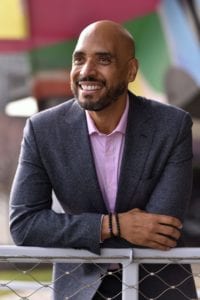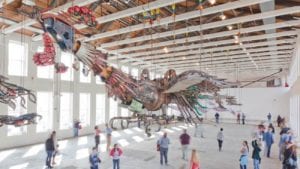Written by Guest Blogger: Brittney Dubose
At a time when many were trying to desperately hold-on to what they had, Michael Bobbitt took a huge leap of faith and accepted the role of Executive Director of Mass Cultural Council. This decision during such tumultuous times takes guts. As an early-career arts administrator, I admire leaders who take risks. It is inspiring to see someone willing to go the full gamut for what they believe in. Michael took on the challenge of navigating Massachusetts’ creative sector through the disruption of the status quo, instead of shying away from the responsibility of successfully leading through COVID-19 and systemic racism. I was excited to catch up with Michael to talk about his new role, what inspired him to take on this opportunity, and his ideas for rebuilding with a focus on diversity, equity, and inclusion.

Brittney: You are almost at the two-year mark since leaving the Montgomery County area and moving to Watertown, MA, how are you feeling?
Michael: It’s a funky question to answer. If I say, I love it, will my DC and Montgomery County friends get upset? If I say, “I miss Montgomery County so much”, will my Massachusetts friends get upset? The truth is, I love it here and I miss Montgomery County and DC soooo much. It’s a bit colder for longer and there are wild turkeys on the streets of Cambridge, where I live, but it reminds me a lot of Montgomery County and parts of DC. Steep in history, a little provincial, and very rich culturally. I love being able to get to so many gorgeous parts of New England in a matter of hours. The strangest part is, most of my time here was stuck in my apartment. So….
Brittney: In the middle of two pandemics, a time when organizations are struggling to financially survive the coronavirus and trying to tackle the issue of institutional and systemic racism, you decided to apply for the position of Executive Director for Mass Cultural Council. It seems like a very daunting task to take on, why did you decide to go for it?
Michael: Initially, either from my own insecurities or my loyalty to New Repertory Theatre, I was not interested in applying. The Executive Search Firm that reached out mentioned numerous people suggested my name. While the work I’ve done as a theatre leader was adjacent to the work of a state arts agency, I couldn’t see a fit. And, I wasn’t sure I wanted to give up being an artist and running a theatre. I had just re-immersed myself into work that wasn’t for children and wanted to relish that for a moment. But after speaking with the search firm, we talked more about the growth and diversification that we had at Adventure Theatre during my tenure AND a similar turnaround that I had at New Rep in a very short time. At Adventure, we dealt with several major organizational struggles – a merger, the government shutdown, a fire – and at New Rep, transitioning the company from a predominantly white business model to predominantly multi-cultural, significant debt, and a 50% drop in patronage prior to my short time there. With each of these difficulties, we emerged stronger, better, and ahead. They pointed out, that perhaps I have an ability to see a crisis as an opportunity. And while dual pandemics seem like a crazy challenge, I feel strongly that I can help a whole sector in a whole state emerge from these stronger and better…with a lot of help from a lot of people.
“Ideally, I’d like to come out of this with a creative boom, rather than just a recovery effort.”
Brittney: How has your previous work prepared you for this role? Both at New Repertory Theatre and Adventure Theatre?
Michael: Adventure was always a vehicle for learning. Partly because of the strained business model. Producing theatre for young people is HARD. It’s a sub-genre of theatre, which doesn’t command the respect it deserves. (How do you have big people artists and arts supporters, if you don’t invest in young people arts exposure.) Funders mostly gave us child-sized gifts. Secondly, you can’t build on your loyal patronage, because little kids age out, and third, the cost of producing is the same as theatre for adults, but the ticket price is $15. So, every day on that job, we had to think creatively about the mission and services. This thinking fine-tuned my skills in problem-solving. I had great mentors and colleagues, namely Leon Seemann who taught me tons about running the business and collaboration.

New Rep was unique. It was in financial and cultural crisis when I walked in, so I had to make big choices fast and navigate the fears, concerns, and pushback of many. And then, with George Floyd’s death, I had to still lead an organization through Covid – 19, while trying to deal with my own emotion as a black man and use the race equity skills I had amassed all while navigating the fragility of a well-intentioned, but under-informed almost all-white board. (Only 1 person of color.) All of this while living in a town where I was still new…where I didn’t have my safety net of friends. It was very hard. The emotional toll fueled a lot of action, which many people around the country noticed. And, it gave me the gumption to press on – which I had never experienced before. And ultimately, it propelled New Rep into a new phase of its existence, garnering new patrons, donors, grants, opportunities, board members (11 BIPOC, when I left), and respect.
Brittney: As Executive Director of the MCC, you are charged with the task of creating compelling stories that express the economic impact of the creative sector and why the industry is vital to the state’s social and economic well-being, in addition to demonstrating the need for additional support in order for the community to rebuild. How will you do this? Does your extensive background as a storyteller benefit you in this work?
Michael: Telling stories is an expertise of mine. Oddly, people have paid me to tell them stories. At six weeks on the job, I’m still in the research phase of the story, spending much time in conversations and reading about what is happening in state and out of state…even around the world. I’ll do a draft, share it with some to get feedback and pull it all together. I do think, ultimately, we’ll need some sort of collective impact cultural economic recovery plan, which I think should include racial diversification (lots of people who like the arts that aren’t included out there), investments in arts education, investments in outdoor creative placemaking, a massive marketing/messaging campaign, and innovations in collaboration with other sectors. Ideally, I’d like to come out of this with a creative boom, rather than just a recovery effort. I’m having fun churning this idea in my head.
“If you want people of color to engage, you have to redesign your business model and EVERY single aspect of it to be predominantly multicultural.”
Brittney: What ideas do you have to create a more equitable and inclusive creative sector for the state of Massachusetts?
Michael: The simplest way I can describe it is shifting the culture around “why it’s important to be equitable”. As I mentioned earlier, predominantly white institutions were designed to be that. Their business models were built by white people for white people and are inherent in the day-to-day functions and services of the organizations. Not to say that those who built or perpetuate the businesses are bad, but this is what they have done and continue to do. At the same time, it’s a mystery to them as to why more people of color don’t engage. Well, the business was not designed for people of color. If you want people of color to engage, you have to redesign your business model and EVERY single aspect of it to be predominantly multicultural. A few policy shifts and programs like discount tickets and outreach initiatives will NOT change your business model.
So, my plan is to share this analogy and then try to provide tools to help people and organizations relook at action plans to address this change in business models and culture.

Brittney: We can say without a shadow of a doubt that we miss you! What do you miss the most about Montgomery County?
Michael: Oh, that makes me cry. I miss walking in a room and knowing half the people there. I miss all the hugs. I miss seeing art and intimately knowing the artists that worked on those projects. And, I have to say, I miss the massive support the legislation provided to Montgomery County arts and culture. I can’t wait to visit.
Brittney: Thank you Michael for chatting with us, AHCMC is excited for a visit from you as well! We look forward to learning more about all of the incredible things you will do and bring to Boston.
Michael Bobbitt shared many gems during our brief conversation but three things truly resonate with me: seeing crisis as an opportunity, coming out of the pandemic with a creative boom, and changing business models to be equitable and inclusive. His vision to redesign business models reminds me of a recent opinion article in Hyperallergic by Toya Lillard. The piece “calls-in” to the philanthropic and nonprofit sectors to relinquish power by expanding their circles of trust and influence beyond white or white-adjacent leadership to people representing the communities they serve. Michael becoming Executive Director of Mass Cultural Council illustrates this kind of intentional action. Not only is he an artist and an arts administrator but, he is also a person of color with innovative ideas that can provide real change. His leadership position gives him a seat at the table to enact these changes from the top down, influencing the culture and structure of Massachusetts‘ entire creative sector to a more diverse and inclusive industry.
As we are hopefully approaching the other side of the pandemic, I hope Montgomery County’s arts and culture community accepts that our only way forward is to embrace the challenges of now and reinvent ourselves so our incredibly vibrant and beautifully diverse cultural sector is ready for whatever the future holds. When reshaping occurs, a world of possibilities emerge. I’m excited just thinking about the endless potential of where we can go and who we can become…are you?
